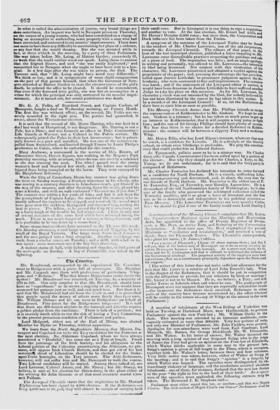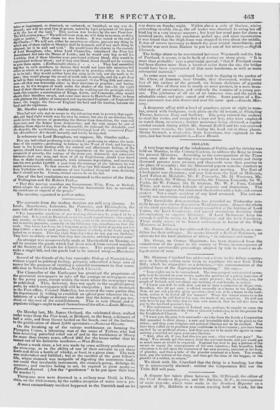A meeting of inhabitants of the West Riding of Yorkshire
was held on Tuesday, at Hartshead Moor, near Huddersfield, to petition Parliament ngainst the new Poor-law ; Mr. William Hocks in the chair. This meeting was attended by an immense multitude, extra- vagantly estimated at more than 200,000. Very few peisons of note, and only one Member of Parliament, Mr. John }laden, were present. Apologies for non-attendance were read from Earl Stanhope, Lord Morpeth, Mr. Baines, Sir Geroge Strickland, Mr. IV. Duncombe, and Mr. Walter. In his letter of excuse, Mr. Walter favoured the meeting with a long opinion of one Sergeant Suigg, who in the reign of James the First had given an opinion on the Poor-law of Elizabeth, which Walter thinks applicable in some way to the present Ism Snigg's opinion is given at full length in the Times, where it occupies, together with Mr. IValter's letter, between three and four columns. Very little notice was taken, however, either of Walter or Siugg at the meeting; and it is said that Snigg's " opinion " is a forgery, by which Walter was hoaxed. The speeches were distinguished by ex- traordinary violence of language, and the resolutions asserted absolute falsehoods: one of them, for instance, declared that the new law denies to the poor "the right to live in the land of their birth." As a speci- men of the speeches most applauded, the following extracts may be taken. The Reverend J. R. Stephens said— Parliament must either repeal this law, or another—and that was :slava Charts. The 46:12 section of Magna Charts ran thus—" No freeman shall be taken or imprisoned, or disseized, or outlawed, or banished, or any way de: ronor will we send him to prison, unless by legal judgment of his peers, steered;
or by the law of the land." This section was broken by the new Poor-law. The 47th section was—" We will sell to no man, we will deny to no man, or delay eight or justice." That clause too was broken. It was stated at the end of the Charta—" We will not, either by ourselves or others, procure any thing by which any of these rights or liberties shall be lessened, and if any such thing be
obtained, let it be null and void." He would leave the charter in the custody of Lord Brougham, who, when Lord Chancellor, introduced the Poor. law Amendment Act into the House of Lords ; and he would only beg to tell his Lordship, that if these liberties were purchased without blood, they would he repurchased without blood; and if they cost blood, blood should not be wanting to gain them again. (Enthusiastic cheers.) . . . . They had assembled together in such numbers, to declare they would not have this atrocious bill either in whole or in part, either in principle or in practice, either in its head or in its tail; they would neither have the sting in its tail, nor the teeth in its jaws; they would plunge the sword of truth into its entrails, and dig a pit deep as hell in their imaginations, in which to entomb 'II the Whig filth and rotten- ness— all that was detestable either in their doctrines or practice' and having done so, by the weapon of truth under the shadow of the law—by the right band of their liberties and of their religion—by working out the principle which made this country a constitution of Kings, Lords, and-Commons—they would sheath their bloodless sword, and come once more to Hartshead Moor, to keep with gladness the jubilee of renovated and regenerated England—of England the brave, the happy, the free—of England the bold and the fearless, because the loyal and the righteous. Mr. Oastler spoke in a similar Strain— They had not only met to secure to the labouring man in povetty that equit- able and legal right which was his own by nature, but also to see whether they could devise the means of protecting the throne from demolition, the rent.roll from rust, and the ledger from destruction; and the only means he saw of effecting those objects was, that the damnable, the infernal. the detestable, and the despotic, the unchristian, the unconstitutional, and the unnatural Poor- late Amendment Act should instantly and totally be repealed.
In reference to Lord Brougham, we suppose, Mr. Oastler said— How any individual professing to be civilized—professing to admire the insti- tions of the country—professing to believe in the Word of God, and having a heart in his bosom beating with the natural and affectionate feelings of the species, should have dared to make this experiment on the poor, invading the receptacle of poverty, the cottage of the worn out, distressed, and emaciated labourer—how any man, and most of all an Englishman, should have dared thus to shake hands with cowards, with infamous degradation, and receiving into his own pocket 14,000/. a year from the earnings of the labourer, he was unable to conceive. To that monster the Poor-law Bill should be rolled back from Yorkshire with the anathema of two hundred thousand men, declaring that it should not be. Curses, eternal curses, be on the bill.
One of the last resolutions we recommend to the notice of the Duke of Wellington and Sir Robert Peel- " That this meeting considers any Government, Whig, Tory, or Radical, which adopts the principles of the Poor-law Amendment Act, as unworthy the confidence or support of the people."
The meeting separated in perfect order.



























 Previous page
Previous page